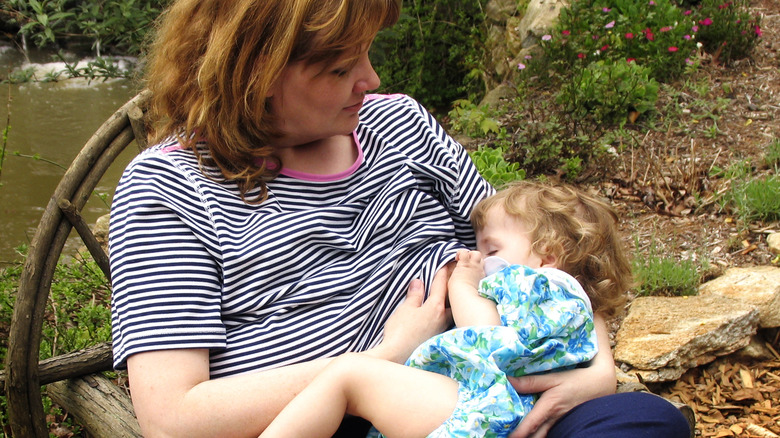Breastfeeding Has A Surprising Benefit For Mothers
We know that the advantages of breastfeeding for babies are myriad and that there are advantages for the mom as well, from faster weight loss after birth to a lower risk of ailments such as anemia and postpartum depression, according to the Cleveland Clinic. Research has shown that there are long-term benefits for the mom too. More specifically, women who breastfeed have a lower risk for developing cardiovascular disease and diabetes than women who don't, per Science Daily. Scientists aren't sure why that is, though.
Now, a study recently published in The Journal of Clinical Endocrinology & Metabolism (JCEM) shows that longer-term nursing leads to a lower accumulation of fats in the body that are associated with heart disease and diabetes. Those two fats are pericardial and visceral, based on where they're stored in the body.
Pericardial fat consists of fatty tissue deposits on the outside of the heart, while visceral fat, sometimes called active fat, is stored in the abdomen near such organs as the stomach, liver, and intestines. It can also build up in the arteries.
An important study looked at the role of fats
The JCEM findings that link breastfeeding with a lower risk of heart disease and diabetes originated with the CARDIA study, according to Science Daily. Started in 1985, CARDIA is a long-term, continuous study of cardiovascular disease that follows over 5,000 women who were between 18 and 30 years old when the study began. The participants have been monitored for over 30 years in an effort to tease out the factors in early adulthood that can lead to heart disease later in life.
Duke Appiah, Ph.D., an assistant professor of public health at the Texas Tech University Health Sciences Center and a coauthor of the JCEM study, says the CARDIA study also includes cumulative measures of breastfeeding. That was important to him and his research team because they wanted to look at the women's entire reproductive lifespan, noting the length of time spent breastfeeding and the amount of fat stores their bodies accumulated. The research team's hypothesis was that the longer a woman breastfed, the less excess visceral and pericardial fat her body would have. And the less fat she has, the lower her risk of developing cardiovascular disease and diabetes later on in life.
Women in the CARDIA study who had one or more births and 25 years of followup were given CT scans to measure their visceral and pericardial fat volumes, according to the JCEM article. They self-reported how long they breastfed their babies overall.
The link between more breastfeeding and less disease for mom
Both visceral and pericardial fat stores are related to insulin production and are known to contribute to diabetes as well as cardiovascular disease, according to Science Daily. In addition, fat stores in the abdomen may increase the risk of experiencing stroke, breast and colorectal cancer, and Alzheimer's disease. While less is known about the effects of pericardial fat, there's enough research to show that such fat, by putting weight on the heart and possibly affecting its contractions, is considered in excess to be a factor in cardiovascular disease.
The research published in JCEM showed that women who breastfed longer over the course of their reproductive years experienced less weight gain and less fat buildup around the heart and in the abdomen. "Breastfeeding more is actually beneficial to a woman's health," Dr. Appiah told Science Daily.
Erica P. Gunderson, Ph.D., another of the JCEM study coauthors, said "....the lower visceral and pericardial fat among women with longer lactation persisted. This indicates lactation may have effects that persist many years through midlife."
The study does not say exactly how long cumulative breastfeeding has to be to develop a protective effect for the woman. But it's best to start with this recommendation: The American Academy of Pediatrics encourages, "exclusive breastfeeding for about six months, followed by continued breastfeeding as complementary foods are introduced, with continuation of breastfeeding for one year or longer as mutually desired by mother and infant."



